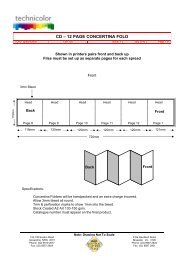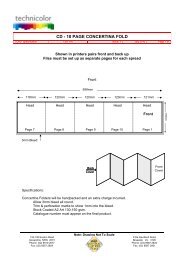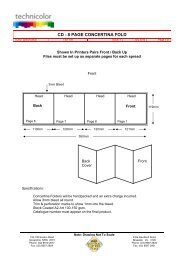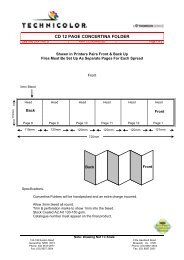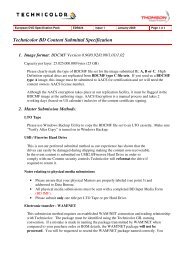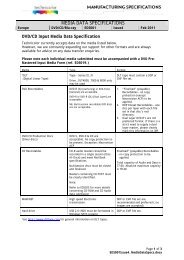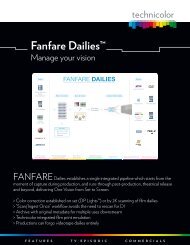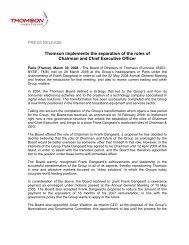FORM 20-F THOMSON multimedia - Technicolor
FORM 20-F THOMSON multimedia - Technicolor
FORM 20-F THOMSON multimedia - Technicolor
You also want an ePaper? Increase the reach of your titles
YUMPU automatically turns print PDFs into web optimized ePapers that Google loves.
ITEM 11 — QUANTITATIVE AND QUALITATIVE DISCLOSURES ABOUT MARKET RISKS<br />
Our policy is not to use derivatives for any purpose other than for hedging our commercial and<br />
financial exposures. This policy does not permit us to take speculative market positions or to<br />
authorize our subsidiaries or businesses to take speculative market positions.<br />
In order to reduce our exposure to interest rate and currency fluctuations, we use currency and<br />
interest rate derivative instruments in accordance with market conditions and within the framework of<br />
procedures established by us. All interest rate transactions are effected centrally. Foreign exchange<br />
operations are monitored centrally in Boulogne and carried out, depending on local regulations or to<br />
permit practical access to the market, either by the corporate treasury department in Boulogne or by<br />
the Singapore regional treasury. Foreign exchange operations for Mexican affiliates are executed by<br />
the U.S. regional treasury. We may also use derivatives to reduce our exposure to stock price<br />
fluctuation of certain of our investments in quoted companies.<br />
Financial instruments are only used to hedge existing or anticipated financial and commercial<br />
exposures or investments. We undertake this hedging in the over-the-counter market with a limited<br />
number of highly rated counterparts.<br />
Exchange Rate Fluctuations<br />
Translation Risks<br />
The assets, liabilities, revenues and expenses of our operating entities are denominated in<br />
various currencies, principally U.S. dollars. Our consolidated financial statements are presented in<br />
euro. Thus, assets, liabilities, revenues and expenses denominated in currencies other than the euro<br />
must be translated into euro at the applicable exchange rate to be included in its financial<br />
statements.<br />
If the euro increases in value against a currency, the value in euro of assets, liabilities,<br />
revenues and expenses originally recorded in such other currency will decrease. Conversely, if the<br />
euro decreases in value against a currency, the value in euro of assets, liabilities, revenues and<br />
expenses originally recorded in such other currency will increase. Thus, increases and decreases in<br />
the value of the euro can have an impact on the value in euro of our non-euro assets, liabilities,<br />
revenues and expenses, even if the value of these items has not changed in their original currency.<br />
The introduction of the euro on January 1, 1999 has partially reduced our translation risk because a<br />
portion of our sales are in countries that have adopted the euro.<br />
Transaction Risks<br />
Commercial Exposure. Our foreign exchange risk exposure mainly arises from purchase and<br />
sale transactions completed by our subsidiaries in currencies other than their functional currencies.<br />
The principal currencies to which we had significant exposure in <strong>20</strong>01 were the U.S. dollar,<br />
Japanese yen, Canadian dollar and Hong Kong dollar.<br />
In order to reduce the currency exposure on commercial transactions, our subsidiaries seek to<br />
denominate their costs either in the same currencies as their sales or in specific cases in currencies<br />
that we believe are not likely to increase in value compared with the currencies in which sales are<br />
made. Our policy is for our subsidiaries to report regularly their projected foreign currency needs and<br />
receipts to the corporate treasury department, which then reduces overall exposure by netting<br />
purchases and sales in each currency on a global basis. Exposures that remain after this process is<br />
hedged with banks using foreign currency forward contracts and occasionally foreign currency<br />
options.<br />
In most cases, our corporate treasury department will hedge the full amount of our estimated<br />
net exposure with banks, thereby eliminating the currency risk. In exceptional cases in which it<br />
97



